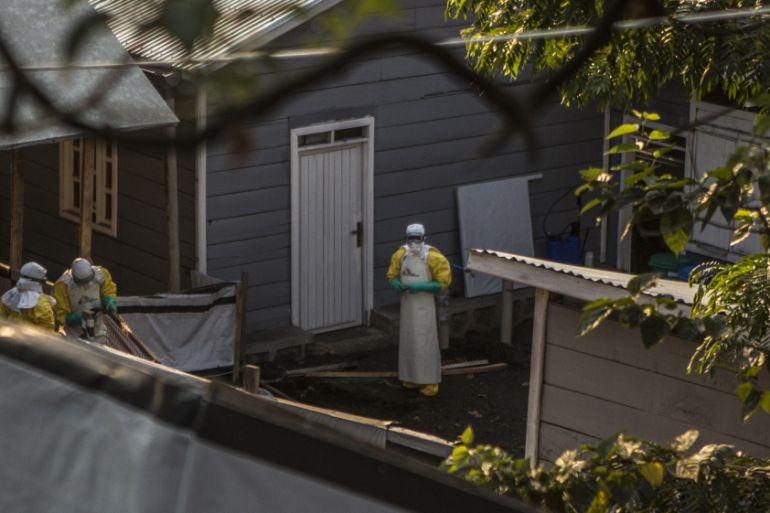New Ebola front as first cases confirmed in DRC’s South Kivu
Year-long DRC outbreak spreads to third province, with a mother dying from disease and her child receiving treatment.

Two Ebola cases, including one death, have been confirmed in the Democratic Republic of Congo‘s (DRC) South Kivu province, according to health officials, opening up a new front in the country’s more than year-long fight against a major outbreak of the deadly virus.
The cases mark the first recorded instances of Ebola in South Kivu since the DRC’s ongoing epidemic erupted at the beginning of August last year in North Kivu province before quickly spreading to neighbouring Ituri province.
Keep reading
list of 4 itemsUganda declares end of Ebola after 4-month outbreak
Uganda’s Ebola outbreak nearly under control, says Africa CDC
Ebola vaccines produced lasting antibodies during trial: Studies
“Two cases which tested positive for Ebola were confirmed overnight in South Kivu, in Lwindi district in the Mwenga region,” South Kivu’s provincial government said in a statement on Friday.
“A 26-year-old victim died and (one of their) children who tested positive is still alive and being treated,” it added.
In a post on Twitter, the World Health Organization (WHO) said the two cases were a mother and her child.
A mother and her child, have been confirmed with #Ebola in Mwenga, South Kivu 🇨🇩. These are the first cases in this province.
As soon as the alert was raised last night, response teams were on the ground ready to provide treatment, start tracing contacts and begin vaccination. pic.twitter.com/g9CWra7PgC
— World Health Organization (WHO) (@WHO) August 16, 2019
The pair had visited Beni, in North Kivu province, which is the centre of the outbreak. They returned to South Kivu province where they fell sick with Ebola. The mother died on Thursday and her child was being treated by a response team, according to a statement by Jean-Jacques Muyembe, the director of the DRC’s National Institute for Biomedical Research.
South Kivu Governor Theo Ngwabidje told reporters that teams from the national anti-Ebola coordination campaign had arrived to provide support to health officials in the area.
Second worst outbreak on record
Some 2,800 people have been infected during the DRC’s latest Ebola outbreak, its tenth to date, with more than 1,900 of those cases proving fatal.
Almost all of the cases have been confined to areas in North Kivu and Ituri provinces, but in June, three people from one family died in neighbouring Uganda from Ebola after returning from the DRC via an unofficial crossing point.
The epidemic is now the second-worst outbreak of its kind on record, trailing behind a major eruption of the virus in West Africa during 2014-2016 which killed more than 11,300 people as it surged through Guinea, Sierra Leone and Liberia.
Last month, the WHO declared the outbreak a public health emergency of international concern just days after the virus spread to a major urban hub for the first time.
Efforts to end the epidemic have been repeatedly hampered by a “perfect storm” of regional insecurity in eastern DRC and deep community mistrust over the crisis and towards authorities.

Amid the unrest, health workers have vaccinated nearly 200,000 people. The vaccine – produced by US pharmaceutical giant Merck – is experimental but is estimated to be 97.5 percent effective. According to the WHO, it may protect a person for up to 12 months.
There is also debate as to whether a second prototype vaccine, made by a subsidiary of US company Johnson & Johnson, should be included in the response strategy.
Meanwhile, US researchers on Monday announced a breakthrough in the quest for a drug to treat Ebola, saying two prototype drugs known by their lab names as REGN-EB3 and mAb114 slashed mortality rates among Ebola patients in a trial in eastern DRC.
The Ebola virus causes fever, vomiting and severe diarrhoea, often followed by kidney and liver failure, internal and external bleeding. The disease is spread by contact with infected bodily fluids.